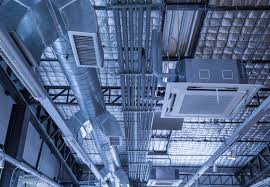
Heating, Ventilation, and Air Conditioning (HVAC) systems are the unsung heroes of modern comfort and efficiency in both residential and commercial spaces. From keeping us cool in scorching summers to cozy and warm during winter chills, HVAC systems play a pivotal role in maintaining indoor air quality and optimizing energy consumption.
Understanding HVAC Systems
1. Heating: HVAC systems provide heating through various methods, including furnaces, boilers, and heat pumps. These systems distribute warmth through ductwork or radiant heating, ensuring consistent comfort in cold weather.
2. Ventilation: Ventilation involves exchanging indoor air with fresh outdoor air while maintaining indoor air quality. Proper ventilation prevents stale air buildup, removes pollutants, and regulates humidity levels for health and comfort.
3. Air Conditioning: In warmer months, HVAC systems cool indoor spaces using refrigerants and compressors. Central air conditioning units distribute cooled air through ducts, while ductless systems offer targeted cooling in specific zones.
Benefits of HVAC Systems
1. Comfort: HVAC systems maintain optimal indoor temperatures year-round, enhancing comfort and productivity for occupants.
2. Energy Efficiency: Modern HVAC systems incorporate energy-efficient technologies such as variable-speed motors, smart thermostats, and programmable controls to reduce energy consumption and lower utility bills.
3. Indoor Air Quality: HVAC systems filter and circulate air, removing dust, allergens, and contaminants to improve indoor air quality and promote a healthier environment.
Maintenance Tips for HVAC Systems
1. Regular Inspections: Schedule routine inspections by HVAC professionals to assess system performance, check for leaks, and ensure components are functioning efficiently.
2. Air Filter Replacement: Regularly replace air filters to maintain airflow and prevent dust buildup, which can strain the system and reduce efficiency.
3. Seasonal Tune-Ups: Before each season, schedule HVAC maintenance to clean coils, check refrigerant levels, calibrate thermostats, and ensure all components are in optimal condition.
Innovations in HVAC Technology
1. Smart Thermostats: Smart thermostats allow remote temperature control via smartphones, learn user preferences, and optimize energy usage based on occupancy patterns.
2. Energy-Efficient HVAC Units: High-efficiency HVAC systems with SEER (Seasonal Energy Efficiency Ratio) ratings significantly reduce energy consumption while delivering superior performance.
3. Indoor Air Quality Solutions: Advanced HVAC systems offer integrated air purifiers, UV germicidal lights, and humidity control options to enhance indoor air quality and mitigate allergens and pollutants.
The Future of HVAC Systems
The future of HVAC systems is poised for further advancements in sustainability, connectivity, and efficiency. Innovations like geothermal heating, solar-powered HVAC units, and AI-driven HVAC controls promise to revolutionize energy use and environmental impact.
